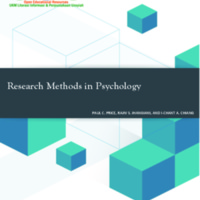Research Methods in Psychology
Dublin Core
Description
Research Methods in Psychology is adapted from a work produced by a publisher who has requested that they and the original author not receive attribution. This adapted edition is produced by the University of Minnesota Libraries Publishing through the eLearning Support Initiative.
While Research Methods in Psychology is fairly traditional— making it easy for you to use with your existing courses — it also emphasizes a fundamental idea that is often lost on undergraduates: research methods are not a peripheral concern in our discipline; they are central.
The overarching goal of this textbook is to present the basics of psychological research methods — focusing on the concepts and skills that are most widely shared within the discipline — emphasizing both their centrality to our field and their contribution to our understanding of human behavior. The book will include several features that will help accomplish this overarching goal.
The Core Concepts: Unnamed Author based his choices about content and terminology on the most influential original books and articles in the research methodology literature—as determined by an empirical analysis of the reference lists of secondary sources. He also relied on the Undergraduate Psychology Major Learning Goals and Outcomes document commissioned by the APA. Although many of the research methods outcomes in that document are addressed in all research methods textbooks (e.g., “Describe how various research designs address different types of questions and hypotheses”), others are rarely mentioned (e.g., “Recognize the limitations of applying normative conclusions to individuals”).
The Examples: The text includes examples drawn from the entire range of contemporary psychology, including abnormal, clinical, and counseling psychology. Unnamed Author also chose examples to show how psychological research has fundamentally changed what we believe to be true about human behavior (for example, in the area of eyewitness memory).
The Style: Unnamed Author concentrated on making the style of this book both straightforward and engaging.
If you are looking for a new research methods textbook for your psychology course that has been used by “teachers” and is thorough in its content, you will find your book Research Methods in Psychology.
While Research Methods in Psychology is fairly traditional— making it easy for you to use with your existing courses — it also emphasizes a fundamental idea that is often lost on undergraduates: research methods are not a peripheral concern in our discipline; they are central.
The overarching goal of this textbook is to present the basics of psychological research methods — focusing on the concepts and skills that are most widely shared within the discipline — emphasizing both their centrality to our field and their contribution to our understanding of human behavior. The book will include several features that will help accomplish this overarching goal.
The Core Concepts: Unnamed Author based his choices about content and terminology on the most influential original books and articles in the research methodology literature—as determined by an empirical analysis of the reference lists of secondary sources. He also relied on the Undergraduate Psychology Major Learning Goals and Outcomes document commissioned by the APA. Although many of the research methods outcomes in that document are addressed in all research methods textbooks (e.g., “Describe how various research designs address different types of questions and hypotheses”), others are rarely mentioned (e.g., “Recognize the limitations of applying normative conclusions to individuals”).
The Examples: The text includes examples drawn from the entire range of contemporary psychology, including abnormal, clinical, and counseling psychology. Unnamed Author also chose examples to show how psychological research has fundamentally changed what we believe to be true about human behavior (for example, in the area of eyewitness memory).
The Style: Unnamed Author concentrated on making the style of this book both straightforward and engaging.
If you are looking for a new research methods textbook for your psychology course that has been used by “teachers” and is thorough in its content, you will find your book Research Methods in Psychology.
Source
http://open.lib.umn.edu/psychologyresearchmethods/
Contributor
Cut Rita Zahara
Rights
Creative Commons
Type
Files
Citation
Author removed at request of original publisher, “Research Methods in Psychology,” Open Educational Resources (OER) , accessed February 17, 2026, https://oer.uinsyahada.ac.id/items/show/176.


